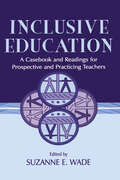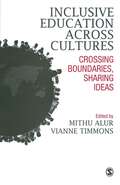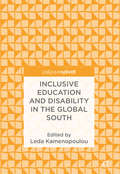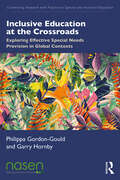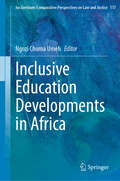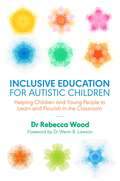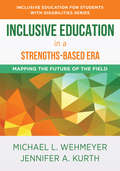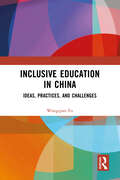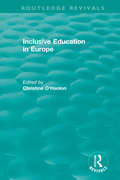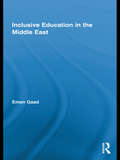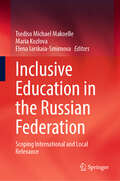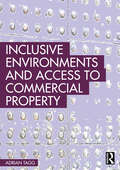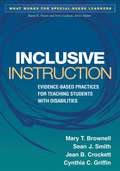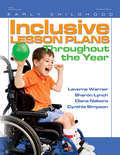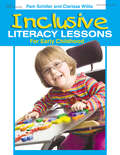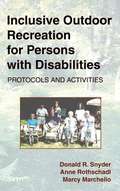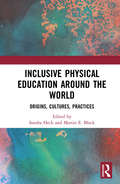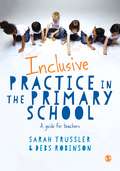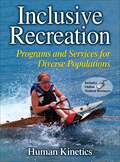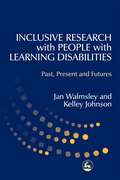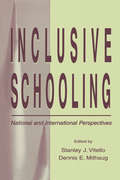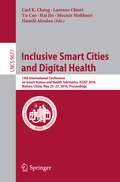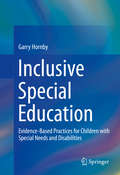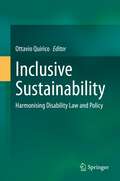- Table View
- List View
Inclusive Education: A Casebook and Readings for Prospective and Practicing Teachers
by Suzanne E. WadeInclusive Education includes two sections: readings and cases. The readings present approaches for creating inclusive classrooms and schools; their purpose is to give prospective and practicing teachers background information in curricular, instructional, assessment, and collaborative problem-solving strategies that foster inclusive education. The Casebook consists of "An Introduction to Cases" and 14 teaching cases based on actual events as experienced by the case authors that describe in rich detail the experiences of parents, students, and teachers related to inclusive education. Most of the cases pose problems or dilemmas to be resolved--including the struggles of parents seeking inclusive education for their children; students' attempts to succeed in general education classrooms; special educators', principals' and teachers' experiences as they collaborate in moving toward inclusive programs; and teachers' concerns for the future success of their students.
Inclusive Education Across Cultures: Crossing Boundaries, Sharing Ideas
by Mithu Alur Vianne TimmonsThis comprehensive collection provides a global perspective on inclusive education. The existing literature delves into whether inclusive practice is about educating children with disabilities or children from diverse backgrounds. The articles in this compilation assert that it is both. Inclusive Education Across Cultures: Crossing Boundaries, Sharing Ideas brings together multiple perspectives to present a compelling case for inclusive practice in different areas of inclusive education, ranging from policy initiatives to practices on the ground level, and advocating and creating awareness. The articles present examples that are explicitly disability-focussed and at the same time present a vision of inclusion that is about societal reform. These articles provide a voice to the people living with disabilities and enable us to learn from their stories. They not only provide theoretical information, but also connect theory and practice by discussing implemented models and practical resources. This work will be a valuable resource material for all those involved in the study of education, social work and psychology.
Inclusive Education and Disability in the Global South
by Leda KamenopoulouThis edited volume examines inclusive education and disability in the global South. Presenting four qualitative research studies conducted in Malaysia, Bhutan, Philippines and Belize, the authors examine the implementation of inclusive education and disabled children’s participation in the education system: contexts on which very little is known. Thus, this book provides a unique opportunity to access rare context-specific information concerning this region of the world; and to reflect on the particular challenges some countries face in the realization of full participation of all children within education. Authored by researchers who are also teaching professionals with experience and understanding of the complexities of the real world, this book reminds us that researchers and policy makers must listen to all voices and perspectives: especially those that have remained silenced and ignored.
Inclusive Education at the Crossroads: Exploring Effective Special Needs Provision in Global Contexts (Connecting Research with Practice in Special and Inclusive Education)
by Philippa Gordon-Gould Garry HornbyInclusive Education at the Crossroads explores the short and long-term effectiveness of government plans to reform policy for special needs education, confronting difficult questions on policies about inclusion and suggesting alternative ways forward for achieving more effective education of children with special educational needs and disabilities (SEND).Inclusion has been a central concern for education systems globally for over three decades. However, has preoccupation with inclusion been at the expense of effective education for children with SEND? Where do policies for inclusion lead, and do they amount to the special education reform that is needed? What do the worldwide experiences of inclusion and special education reveal about how to improve the quality of education systems for all children in the future? How effective is the provision for children with SEND today? Through this informative and topical book, Gordon-Gould and Hornby shine an interrogating spotlight on current provision for SEND and ask if current legislation and policy inadvertently reinforce problems; if they cause many children with SEND to fall short of their potential, as well as preventing many schools from improving their levels of overall academic attainment. Inclusive Education at the Crossroads provides theory and research for teachers, school leaders, governors, policy makers, researchers, parents, post graduate students and anyone seeking practical solutions to meeting the needs of pupils with SEND in any global context. It will encourage open debate about the essence of educational inclusion in order to stimulate creative thinking among all stakeholders.
Inclusive Education Developments in Africa (Ius Gentium: Comparative Perspectives on Law and Justice #117)
by Ngozi Chuma UmehThis book contributes to the discourse on disability in Africa as an issue of systemic exclusion characterized by the discrimination and often complete segregation of persons with disabilities (PWDs) in various African countries. Despite the inclusive promise of the Convention on the Rights of Persons with Disabilities (CRPD) as well as the Protocol to the African Charter on Human and Peoples’ Rights on the Rights of Persons with Disabilities in Africa, the situation has not actually improved for PWDs in Africa. Given the powerful evidence of the devaluation of PWDs in connection with the COVID-19 pandemic, it is high time to reflect on the experiences of persons with disabilities in education, along with other forms of discrimination they encounter. The book’s respective chapters assess how well the existing legal frameworks, policies and practices in most African countries have met the needs for inclusion of children and adults with disabilities. The social and economic rights of persons with disabilities are protected in the constitutions of most countries and enshrined in the normative frameworks that most African leaders have adopted and ratified. These commitments need to be borne in mind when thinking about the present and the future. Inclusive development is an investment and must be viewed as part of a package of reforms that are connected to substantive social protection and improvements in realizing other socio-economic goods. Indeed, a range of alliances are needed to advance the goals of ‘leaving no one behind’, ensuring ‘education for all’, and delivering on the African Union’s call for the development of policies, programmes and requisite budgets for the realization of inclusive education for persons with disabilities.
Inclusive Education for Autistic Children: Helping Children and Young People to Learn and Flourish in the Classroom
by Rebecca WoodThis book presents original, empirical research that reframes how educators should consider autism and educational inclusion. Rebecca Wood carefully unpicks common misapprehensions about autism and how autistic children learn, and reconsiders what inclusion can and should mean for autistic learners in school settings. Drawing on research and interwoven with comments from autistic child and adult contributors throughout, the book argues that inclusion will only work if the ways in which autistic children think, learn, communicate and exhibit their understanding are valued and supported. Such an approach will benefit both the learner and the whole classroom. Considering topics such as the sensory environment, support, learning and cognition, school curriculums, communication and socialisation, this much needed book offers ideas and insight that reflect the practical side of day-to-day teaching and learning, and shows how thinking differently about autism and inclusion will equip teachers to effectively improve teaching conditions for the whole school.
Inclusive Education in a Strengths-Based Era: Mapping the Future of the Field (Inclusive Education for Students with Disabilities #0)
by Michael L. Wehmeyer Jennifer KurthIt’s time to focus on what students can do, rather than what they can’t. In this inaugural book in their Inclusive Education for Students with Disabilities series, Michael L. Wehmeyer and Jennifer A. Kurth explore central, defining questions for the field of special and inclusive education: who, what, and where do we teach; what works in inclusive education; and where does inclusive education go now? Arguing that the concept of disability for the past fifty years has emphasized students as incapable and incompetent, the authors propose instead to build on a growing understanding that students with disabilities can be successful and meet high expectations, and that educators have the knowledge and skills to achieve this. From this strength-based perspective, the presumption is that disability is part of, and not apart from, typical human functioning. Using this lens, Wehmeyer and Kurth describe effective practices to guide instruction in inclusive settings—practices that begin with a consideration of each student’s strengths and capacities, rather than with a diagnosis.
Inclusive Education in China: Ideas, Practices, and Challenges
by Wangqian FuBy adopting a comparative approach, this book investigates the philosophy, policy, practices, and challenges of inclusive education in the Chinese contexts, recognizing influences of Chinese culture, such as Confucianism, collectivism, and familism. In the 1980s, the Chinese government promoted a policy named “Learning in Regular Classroom” to ensure educational rights for children with disabilities, which subsequently turned into an inclusive education program in the western sense. Starting from this point, the policy and practice of inclusive education have developed tremendously. To facilitate reflection and future development, this is the latest and most comprehensive attempt at understanding the status quo of inclusive education in China from a variety of perspectives: from early childhood to higher education, from family to schools and communities, from peers to teachers and parents. It also analyzed the unique Chinese philosophy of inclusive education, adding to current debates with a Chinese lens. This book will appeal to academics, students, and practitioners in disciplines such as education, early childhood studies, sociology, social work, social policy, disability studies, and youth studies.
Inclusive Education in Europe (Routledge Revivals)
by Christine O'HanlonOriginally published in 1995, this book offers a crucial view of the implementation of legislation for the integration of pupils with special educational needs in EU countries at the time. The match or mismatch between the rhetoric and reality, between the policy and the practice are reviewed by presenters from a recent appraisal of progress in individual national contexts. Authors are critical of the situation in their own countries and call upon recent and relevant research sources to support their views. The relationships between particular themes in the education of pupils with special needs are observed and compared in a broad European context.
Inclusive Education in the Middle East (Routledge Research in Education)
by Eman GaadThe potential of adopting inclusive education to support learning for all is an international phenomenon that is finding its way to the Middle East and the Arabian region. Eman Gaad examines the current status of inclusive education in Arabia and the Middle East through an assessment of the latest international, regional, and local research into inclusive education. With a focus on the more complex areas of related cultural practice and attitudes towards inclusive education in this dynamic and fast-changing part of the world, Gaad offers a research-based analysis of the current educational status of the Arabian Gulf and some Middle Eastern countries that adopted inclusive practice in education, and others that are yet to follow. This book will be of great interest to students, academics, teachers, and therapists in the field of comparative and inclusive education as well as those with an interest in policies of education in the dynamic and culturally distinguished Middle Eastern Arabian region.
Inclusive Education in the Russian Federation: Scoping International and Local Relevance
by Tsediso Michael Makoelle Maria Kozlova Elena Iarskaia-SmirnovaMarketing text: This book provides the first evidence-based accounts of inclusive education in a Russian context. It explores the critical educational changes in the Russian Federation within the post-soviet space and internationally. The book analyzes the transformation of educational practices as Russia transitions from an educational model of student support with an emphasis on disability to a broader conceptualization of inclusive education. Among others, this book discusses inclusive education in the context of: • School and preschool institutions; • higher education institutions; • non-Russian-speaking children and children with migration experience; • culture-sensitive education; • indigenous minorities; • technological and methodological support; • the role of stakeholders such as NGOs, parents, and other social groups; • teacher preparation and professional development. This book is intended for teachers, inclusive education coordinators, principals and school managers, policymakers, teacher educators, scholars of inclusion, and university professors, along with community organizations and students of inclusive courses in a Master in Education.
Inclusive Environments and Access to Commercial Property
by Adrian TaggThis book presents and examines the challenges and compromises required to deliver inclusivity in the existing commercial-built environment and the socio-economic benefits that could result from successfully delivering it.To illuminate the advantages of an inclusive environment to property owners, investors and service providers, the book covers the history of disability and evolution of the legislation and examines the demographics and types of disability to question the ‘one size’ ‘blanket’ approach that currently exists to providing access. Delving further into the characteristics of the commercial property sectors and individual disability-specific requirements, experienced commercial building surveyor, Adrian Tagg, analyses the contradictions in the existing legislation to establish examples of design compromise or reasonable adjustments. He seeks to contextualise public and commercial attitudes to disability and go further to demystify the term ‘reasonable adjustment’, which is used currently as a tool of compromise in providing access. The aim is to assess disability-specific requirements for access, as well as adopt a simplistic approach to developing access solutions to the existing built environment from a consultancy and user perspective.Ultimately, this publication hopes to promote accessibility and inclusion from the perspective of surveyors, investors and landlords working in commercial property. It is not just targeted at those on undergraduate or post-graduate surveying courses, as well as those early career professionals undertaking their APC or post-graduate qualifications, but also at those owning or delivering goods, services and employment from commercial premises who want to make a difference.
Inclusive Instruction
by Sean J. Smith Mary T. BrownellThis accessible book presents research-based strategies for supporting K-8 students with high-incidence disabilities to become accomplished learners. The authors clearly describe the core components of effective inclusive instruction, showing how to recognize and respond to individual students' needs quickly and appropriately. Teachers are provided with essential tools for managing inclusive classrooms; planning a curriculum that fosters concept development across content areas, promotes strategic learning, and builds fluent skill use; and integrating technology into instruction. Case examples illustrate ways that special and general education teachers can work together successfully to solve complex learning problems and improve outcomes for students who are struggling.
Inclusive Lesson Plans Throughout the Year
by Cynthia Simpson Diana Nabors Laverne Warner Sharon LynchInclusive Lesson Plans Throughout the Year has over 150 lesson plans for teachers who have children with special needs in their early childhood classrooms. Perfect for both beginning teachers and veteran teachers, Inclusive Lesson Plans Throughout the Year helps new teachers develop plans for each day and provides veteran teachers with new ideas and approaches to add spark to their classroom teaching. The first chapter provides information on planning for children's needs, best practices, the learning environment, and planning instructions. The lesson plans in the subsequent chapters are organized by theme and follow a typical school year, offering teachers a plan appropriate for all children.Each lesson plan is complete with learning objectives, the lesson, a review, materials list, directions for preparation, an assessment component, extension activities to connect the lesson to different areas of the curriculum, and adaptations or modifications for children with a variety of special needs.Each lesson plan has accommodations or modifications for children with: * Autism Spectrum Disorder * Speech and language impairments * Visual impairments* Hearing impairments* Orthopedic impairments * ADHD* Cognitive and/or developmental delays * Emotional disturbances
Inclusive Literacy Lessons for Early Childhood
by Pam Schiller Clarissa WillisBest-selling, award-winning authors Pam Schiller and Clarissa Willis have teamed up to create this collection of 100 literacy lessons, designed to introduce children ages 3-6 to a variety of literacy concepts and build important literacy skills. Each of these simple, fun lessons offers adaptations for children with special needs, including:*Visual impairments br>*Hearing impairments br>*Cognitive challenges br>*Motor delays br>*Speech/language delays br>*Emotional/behavior issues br>*The first page of each two-page lesson features a learning objective, a literacy activity, extension activities, a daily reflection, and vocabulary. The second page has adaptations specific to the literacy lesson for children with special needs.A great grab-and-use book for preschool teachers!
Inclusive Outdoor Recreation for Persons with Disabilities: Protocols and Activities
by Donald R. Snyder Anne Rothschadl Marcy MarchelloInstructors can use this text to teach program design principles. Practitioners can use the information to develop programs, services, protocols, and activities to better serve persons with disabilities in their use of the great outdoors.
Inclusive Physical Education Around the World: Origins, Cultures, Practices
by Sandra Heck Martin E. BlockInclusive Physical Education Around the World is the first book to survey inclusive physical education worldwide, to examine the history of inclusive physical education across different regions, and to compare their policy, practice and educational cultures. Featuring the work of leading researchers from Africa, Asia, Australia, Europe, the Middle East, North America and South America, the book provides a unique interdisciplinary contribution to the fields of physical education, history and pedagogy. It provides readers with information on the origins and historical development of inclusion in schools and teaches them about different ways that inclusive physical education has grown and is implemented in different countries. This is essential reading for anybody with an interest in physical education, disability sport, adapted physical activity, special educational needs (SEN) teaching or social justice in education. It is a vital resource for postgraduates, researchers and academics who are interested in studies on inclusion and heterogeneity, as well as sport and cultural historians, physical education teachers and students.
Inclusive Practice in the Primary School: A Guide for Teachers
by Sarah Trussler Debs RobinsonDo you want to feel more confident when teaching children with Special Educational Needs and Disabilities (SEND)? Would you like to be a more inclusive teacher? This book provides clear and flexible frameworks for effective inclusive teaching, and explains how to teach and plan for supporting any child's learning, no matter what their needs are. With case studies and activities the book: explains and contextualizes current beliefs towards SEN provides models for practice encourages you to engage in thinking about SEN and inclusion offers interactive reflection points throughout links out to research with suggestions for further reading Whether you're training to be a primary school teacher or already in the classroom this book will make you feel confident to be the inclusive teacher you need to be.
Inclusive Practice in the Primary School: A Guide for Teachers
by Sarah Trussler Debs RobinsonDo you want to feel more confident when teaching children with Special Educational Needs and Disabilities (SEND)? Would you like to be a more inclusive teacher? This book provides clear and flexible frameworks for effective inclusive teaching, and explains how to teach and plan for supporting any child’s learning, no matter what their needs are. With case studies and activities the book: explains and contextualizes current beliefs towards SEN provides models for practice encourages you to engage in thinking about SEN and inclusion offers interactive reflection points throughout links out to research with suggestions for further reading Whether you’re training to be a primary school teacher or already in the classroom this book will make you feel confident to be the inclusive teacher you need to be.
Inclusive Recreation: Programs and Services for Diverse Populations
by Human KineticsEveryone should have the opportunity to enjoy the benefits of recreation. As the demographics of our communities continue to change and expand, it will be more important than ever for recreation professionals to be prepared to provide access to anyone and everyone who wants to participate. In Inclusive Recreation: Programs and Services for Diverse Populations, students will learn to provide programs and services not only to individuals with disabilities but also to people of both sexes and all ages, cultures, ethnicities, races, and religions.
Inclusive Research with People with Learning Disabilities: Past, Present and Futures
by Jan Walmsley Kelley JohnsonIn this thought-provoking book, Jan Walmsley and Kelley Johnson discuss participative approaches to research and provide an up-to-date account of inclusive practice with individuals with learning disabilities. Drawing on evidence from two major studies, they explain how lessons learnt from inclusive research in the learning disability field are applicable to others working with marginalized groups. The authors examine the origins and the process of inclusive research, describing: * how and why it takes place * who carries it out * who funds it * how it is designed * how it relates to policy and practice. They look at the challenges inherent in this work, such as balancing the voice of the researcher with that of disabled participants and clarifying roles within research projects, and explore how it can become more inclusive and empowering. Providing valuable information and advice to researchers, policy makers and students as well as other health and social care professionals, this book presents a comprehensive examination of participative research in social care.
Inclusive Schooling: National and International Perspectives (Rutgers Invitational Symposium on Education Series)
by Stanley J. Vitello Dennis E. MithaugThis book provides new information on how various inclusion policies have been implemented in different schools and school districts in North America and in a range of European countries. The purpose of inclusion policy is to prevent the marginalization of people who experience unfavorable circumstances in life. It is an approach to the education of students with disabilities that is based on a commitment to what all members of a free society deserve in order to become fully participating members--a fair chance to find a meaningful place in their own communities. This book is a kind of status report on what inclusive education has achieved and what it may achieve in the future for children and youth with disabilities. It describes the philosophical, legal, and practical terrain covered by inclusion policy in general and inclusive schooling in particular. Contributors assess inclusion policy and suggest ways to reconceptualize it, bringing to their data analysis a depth of experience and knowledge about public schooling in their respective countries. Although inclusion of students with disabilities in general education classes has been embraced by politicians and educators calling for equal opportunity in our society and is being incorporated into national and international education laws, it continues to be controversial and the debate is sometimes heated. A goal of this book is to shed some light on this debate. Is inclusion mostly about student placement? Are students with disabilities attaining social and learning membership in general classrooms? Have they benefitted from inclusion? How about students without disabilities? What have been the benefits? Must learning take second priority to socialization and friendship? Are teachers getting the training they need? How do parents feel about inclusion programs? How do students feel? What kind of curricular accommodations should be made? These and other questions are addressed. This volume is based on original papers presented by the contributing authors in October 1997 at the Rutgers Invitational Symposium on Education on Inclusive Schooling: National and International Perspectives.
Inclusive Smart Cities and Digital Health
by Carl K. Chang Lorenzo Chiari Yu Cao Hai Jin Mounir Mokhtari Hamdi AloulouThis book constitutes the proceedings of the 14th International Conference on Smart Homes and Health Telematics, ICOST 2016, held in Wuhan, China, in May 2016. The 39 regular papers, 5 short papers and 1 poster paper included in this volume were carefully reviewed and selected from 83 submissions. They were organized in topical sections named: smart homes, smart urban spaces and new assistive living space concepts in the smart city; e-health for future smart cities; context awareness and autonomous computing; home networks and residential gateways; middleware support for smart homes and health telematic services; e-health and chronic disease management; e-health technology assessment and impact analysis; tele-assistance and tele-rehabilitation; modeling of physical and conceptual information in intelligent environments; medical big data collection, processing and analysis; human machine interfaces; wearable sensors and continuous health monitoring; social, privacy and security issues; mobile health services; and smart rehabilitation technologies.
Inclusive Special Education
by Garry HornbyMuch has been written about special education and about inclusive education, but there have been few attempts to pull these two concepts and approaches together. This book does just that: sets special education within the context of inclusive education. It posits that to include, effectively, all children with special educational needs in schools requires an integration of both concepts, approaches, and techniques. It has never been more timely to publish a book that helps professionals who work with schools, such as psychologists, special education professionals, and counselors, to identify effective practices for children with special needs and provide guidelines for implementing these in inclusive schools.
Inclusive Sustainability: Harmonising Disability Law and Policy
by Ottavio QuiricoIn light of the third-generation concept of ‘inclusive sustainability’, the volume explores the architecture of global disability governance and its degree of harmonisation. The book integrates socio-cultural, economic, political and legal analyses from an international and comparative perspective. The first part of the volume outlines a tripartite systematisation of disability rights for States and non-state persons. In light of essential economic considerations, the second part explores the relationship between disability and specific fundamental rights and regimes, particularly the rights to life, health, education, work and participation. The third part takes an institutional approach and focuses on the way in which the UN and regional organisations regulate disability (rectius, different ability).
